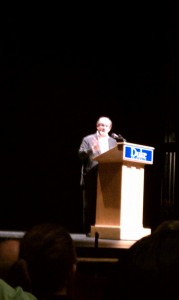 On April 12, Salman Rushdie gave a lecture at Duke University titled, “Public Events, Private Lives: Literature and Politics in the Modern World.” As far as lectures by novelists go, I have seen better. To be fair, I would say it was merely boring. To be mean, I would say it was vacuous. But I am saying neither, so I’ll just give a distilled summary of Rushdie’s comments on literature and politics, say a few words about what I think of his politics, and leave you to make your own opinion.
On April 12, Salman Rushdie gave a lecture at Duke University titled, “Public Events, Private Lives: Literature and Politics in the Modern World.” As far as lectures by novelists go, I have seen better. To be fair, I would say it was merely boring. To be mean, I would say it was vacuous. But I am saying neither, so I’ll just give a distilled summary of Rushdie’s comments on literature and politics, say a few words about what I think of his politics, and leave you to make your own opinion.
Rushdie’s main point:
At a time when political power seeks heedlessly to erode what is most human about our world, literature–the novel in particular– has a massive role to play.
What is the nature of this role?
Through their work, writers oppose political leaders when they claim monopoly over truth and act like their sense of the world marks the limit of what can and cannot be dreamed or achieved. Since political systems tend not to remember the past as they ought, the writer likes to jar their memory, compelling them to give an account of the past no matter how unsettling it might be. Most of all, literature refuses to surrender life to the order of the state. When politics encroaches on daily life and leave us “brutalized by power,” art prevents our human values from being completely eradicated. Literature injects into society “the things that make us human”–making love, showing affection, laughing, living the ordinariness of the everyday, etc. No surprise then that, for Rushdie, “Man is a storytelling animal.” Clearly, Rushdie believes that the capacity to tell stories is one way to think about what defines the human. Telling stories, insisted Rushdie, “is our existential heritage.” This would also explain his praise of the novel’s simplicity of fabrication. “All you need is a piece of paper and a room.” By helping us think of identity more broadly, the novel also helps us “build tolerance and promote civilization.” In this sense, the novel can help counteract what Rushdie thinks of as identity politics based on anger. He lamented the fact that we live in a world were rage is the ground for identity, where you are what you are angry about. However, the novel, in its pluralistic sensibility, offers us a way out by compelling us to think of ourselves in ways that do not exclude others. Evoking the American novelist Saul Bellow, Rushdie noted that the task of the novel is therefore to “open the universe a little more.”
My Ten Cents
If Rushdie’s novel-can-save-the-world outlook seems old and overwritten, it is because it probably is. Ideas like this sound pleasing to the ear and leave us with the fuzzy feeling of hope that the world will survive its darkest moment. It is not that Rushdie’s version of the age-old liberal humanist vision of the world is not lovely. It truly is. To claim that the “novel is unstoppable” and to suggest that novelists can eradicate dictators is inspiring and makes a good poster of the writer as an action movie hero. But is it not at bottom all fluff, espoused by those who have grown used to philosophizing on a full stomach and seeing the world from the shimmering spotlight of a university podium?
The Cool Stuff
Notwithstanding that Rushdie’s politics is blah and a tad bit antique. There were moments of refreshing eloquence. I particularly like his sense that the novelist’s business of trafficking in stories is no joke. And that sometimes, it is the surest way to court one’s peril. Indeed, the novel’s task of opening up boundaries is not for the fainthearted. To push boundaries, you have to go right up to the boundary itself and confront it in all its dangers. It is in this sense that writing is risky business. It throws the writer who wants to open up the universe a litter more against systems of power that are always seeking to close it off. In a morbid sort of way it is striking that “art proves to be very durable and survives the tyrant” even though the artist is not as lucky. At the end of this reflection, Rushdie invited the audience to think of Lorca, Ovid, Mandelstam. All dead. Dead because of the threat their writing posed to power. Yet their ideas live on. “Writers,” remarked Rushdie, “are more vulnerable than their ideas.”








New Blog at The New Yorker | Brittle Paper May 15, 2012 12:58
[...] foofoo liberal cliches about freedom and creativity. Last time he was at Duke Uni, it was: “Man is a storytelling animal.” Today on Page-Turner it’s: “Liberty is the air we breathe.” And why is [...]